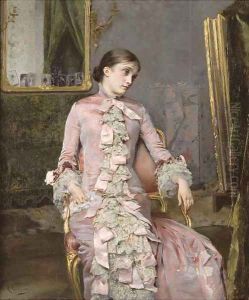Rogelio De Egusquiza Barrena Paintings
Rogelio De Egusquiza Barrena was a Spanish painter, known for his involvement in the Symbolist movement and his close connection to the music of Richard Wagner. Born on August 18, 1845, in Torrelavega, Cantabria, Spain, Egusquiza showed an early interest in the arts. He moved to Madrid to study at the Real Academia de Bellas Artes de San Fernando where he developed his artistic skills. His early work was influenced by the Romantic movement, but he gradually shifted towards Symbolism.
Egusquiza lived in an era marked by the transition from Romanticism to Modernism, and his work encapsulates elements of both. After completing his studies in Madrid, he traveled to Paris in 1876, which was then the epicenter of the art world. It was in Paris that he became deeply influenced by the music of Richard Wagner, which would become a recurring theme in his work. Egusquiza was not just a painter but also an accomplished engraver and illustrator, and he often used these skills to depict scenes from Wagner’s operas.
His time in Paris led to the refinement of his technique and a deepening of his artistic vision. Egusquiza's relationship with Wagner's music was both profound and personal, and it led him to create a number of works inspired by the composer's operas, such as 'Tristan and Isolde' and 'Parsifal'. He was known for his ability to translate the dramatic intensity and mythological themes of Wagner's music into visual form, creating powerful and evocative images that resonated with the Symbolist ethos of exploring the mystical and the ineffable.
Egusquiza’s style was characterized by a use of rich color and a tendency towards ethereal and dreamlike compositions. His work received recognition in Spain and abroad, and he maintained connections with other influential artists and intellectuals of his time. Despite his success, Egusquiza remained dedicated to his own unique vision, which often led him to eschew the prevailing trends of the art world in favor of his personal exploration of Symbolism and Wagnerian themes.
Rogelio De Egusquiza died on February 10, 1915, in Madrid. His works continue to be appreciated for their technical skill and their passionate interpretation of music and myth. Egusquiza's legacy is that of a bridge between movements and a testament to the power of music as inspiration for visual art.
